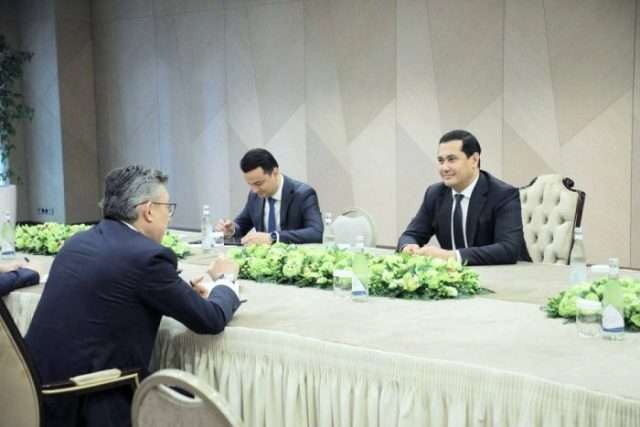Uzbekistan and Kazakhstan strengthened their economic cooperation

The recent meeting between Uzbek and Kazakh representatives to discuss economic and trade cooperation highlighted both countries’ necessity to create a stable regional market and improve local financial performance to attract more foreign investments.
On February 11th, 2022, Deputy Prime Minister, Minister of Investments and Foreign Trade of Uzbekistan Sardor Umurzakov met with Minister of Trade and Integration of Kazakhstan Bakhyt Sultanov, who arrived in the Uzbek capital, accompanying Prime Minister of Kazakhstan Alikhan Smailov during an official visit.
The meeting participants discussed the prospects for the development of bilateral cooperation in key areas, including in the context of the implementation of the agreements reached during the last year’s visit of the President of Uzbekistan to Kazakhstan. The primary vectors for the further development of the Uzbek-Kazakh partnership were the spheres of trade and investment, transport, and industry.
As part of the implementation of the Road Map project aimed at enhancing cooperation in the field of trade, the parties reached an agreement on the establishment of joint wholesale distribution centres in the territories of both states. Sardor Umurzakov and his Kazakh counterpart also considered several specific joint projects during the meeting. They agreed on further cooperation to promptly resolve all issues related to developing trade and economic cooperation between Uzbekistan and Kazakhstan.
Geopolitical scenario
After the recent political crisis due to high energy prices, Kazakhstan needs to stabilise its economy and improve its trade. At the beginning of January 2022, the Kazakh Government faced several protests, which led President Qasym-Jomart Toqayev to request the Collective Security Treaty Organisation (CSTO) intervention to contrast what the leadership called ‘foreign agents and terrorists’ who exploited the situation to change the governance (Geopolitical consequences of the political crisis in Kazakhstan, Geopolitical Report Volume 15 Issue 1). Heavily dependent on oil and gas revenues and Russian and Chinese economic supports, Kazakhstan needs to diversify its economy, attract foreign direct investments (FDIs) and improve standard living conditions to avoid future security problems and internal crisis as the Kazakh leadership experienced at the beginning of this year.
The meeting confirms Tashkent’s foreign policy to promote regional partnerships and stability. Uzbekistan needs a stable Central Asia to improve its regional trade and economic performance. Therefore, cooperating with Kazakhstan might increase trade turnover and support the neighbouring Kazakh economy to avoid a political crisis whose consequences might influence the Uzbek territory and allow ‘foreign agents and terrorist groups to gain ground in the country.
Why does it matter?
Kazakhstan-Uzbekistan economic and trade partnership might stabilise local markets and create favourable conditions for foreign direct investments (FDIs) and those entrepreneurs interested in setting up a business in Central Asia. Both the countries are well-positioned in Central Asia and linked with local markets, Beijing’s Belt and Road Initiative and Moscow’s Eurasian Economic Union (EAEU).
